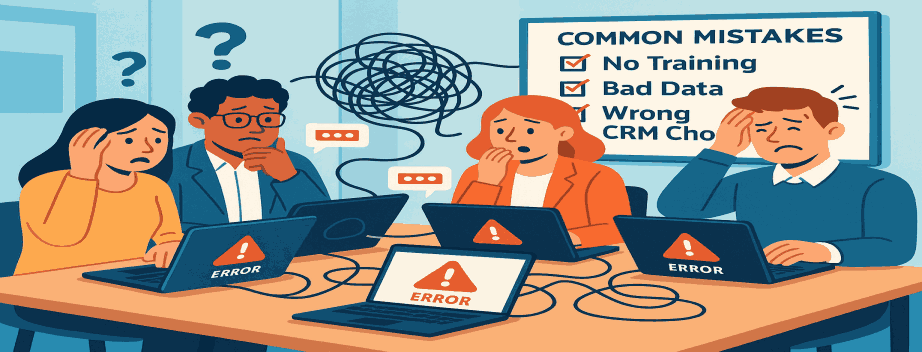
In the fast-paced world of technology today, companies can't afford to operate blind when it comes to customer relationship management. CRM software are now a must-have for companies to manage and monitor leads, cultivate prospects, enhance customer care, and ultimately increase revenue.
But the reality is this: A poorly executed CRM can harm your business more than it helps.
If you're poised to implement a CRM platform or already fighting one it's essential to steer clear of these 5 prevalent (and expensive) errors. Let's dissect them with real-world solutions to ensure your success.
1. Selecting the Incorrect CRM for Your Business
The Error:
Most companies choose a CRM due to hype, brand, or a friend's suggestion without assessing if it meets their distinctive requirements.
Why It Hurts:
Having a CRM that is too complicated (or too simple) for your process can translate to low adoption, wasted effort, and underperformance.
Avoid It:
Determine your needs prior to browsing around: What are the essential features? (e.g., pipeline tracking, automation, mobile connectivity)
Consider your team size, sales process, and growth plans.
Make use of free trials and demos.
Read comparison guides and industry-specific reviews.
Pro Tip:What is good for an enterprise will not necessarily be good for a small team. Always prioritize fit over flash.
2. Skipping Employee Training
The Mistake:
Assuming your staff will dive in to the CRM and "figure it out."
Why It Hurts:
Untrained users = inaccurate data input, unused functionality, and frustration. If your staff is not at ease with the system, they simply won't utilize it.
How to Avoid It:
Arrange hands-on training sessions specific to each department.
Offer simple-to-use manuals or brief video tutorials.
Appoint internal CRM champions—employees who lead and assist others.
Invite feedback for ongoing improvement.
Spending money on training initially results in improved adoption and ROI in the long run.
3. Not Defining Clear Goals and KPIs
The Mistake:
You're implementing a CRM, but… for what?
Why It Hurts:
If there are no clear goals, you can't have any measurable success or know what works. The CRM turns into a pricey contact list, rather than a growth driver.
How to Prevent It:
Establish SMART goals (Specific, Measurable, Achievable, Relevant, Time-bound).
Establish KPIs such as:
Lead conversion rate
Customer acquisition cost (CAC)
Sales pipeline velocity
Customer lifetime value (CLTV)
Check progress monthly and adjust your approach.
Your CRM is a compass use it to monitor performance and adjust.
4. Importing Messy, Duplicate, or Outdated Data
The Blunder:
You bring in all your current data into the new CRM without cleaning it first.
Why It Hurts:
Dirty data clutters your CRM, confuses your team, and destroys reports. Duplicate contacts, missing fields, or outdated information cause bad decisions.
How to Avoid It:
Audit and clean your database prior to migration.
Deduplicate records and normalize naming conventions.
Delete inactive or irrelevant contacts.
Put someone in charge of data hygiene for the long term.
Clean data = improved automation, personalization, and customer insights.
5. Not Utilizing Customization and Automation
The Mistake:
Utilizing your CRM "out of the box" and not customizing it to your process.
Why It Hurts:
Each business has a process. If that process isn't represented in your CRM, your team will do work by hand or worse ignore the system.
How to Avoid It:
Customize fields, tags, and dashboards to fit your process.
Configure automations for activities such as:
Sending follow-up emails
Assigning leads by region
Reminders for contract renewals
Integrate your CRM with other applications such as email, calendars, and marketing systems.
Your CRM is a digital assistant let it do the heavy lifting so that your team can concentrate on selling.
Bonus Tip: Engage Your Team Early
An effective CRM implementation is a team effort. Engage your users in the decision-making process, get feedback on a regular basis, and create a culture of CRM usage.
People support what they help create.
1. How long does it take to deploy a CRM system?
Small businesses usually go live within 1-3 months of time. Large-scale setups or companies can take 3-6 months or even more.
2. What's the single largest reason CRM projects fail?
The number one reason is lack of user adoption. Even the greatest tool won't be of any use if your team isn't adopting it.
3. Do I need technical skills to run a CRM?
Not necessarily. Most CRMs are easy to use with drag-and-drop functionality. Having someone who is tech-savvy to take care of integrations and automations is useful, though.
4. Does CRM software just belong to the sales team?
No! Marketing, customer service, and even finance departments can gain from CRM insights and workflows.
5. Can I change CRM platforms later if I'm not satisfied?
Yes!
Yes, but it’s not always easy. That’s why it’s important to choose the right one from the start. Always export your data regularly and document processes.
Implementing a CRM is one of the smartest movesyour business can make but only if done right. Avoid the common traps of poor planning, bad data, lack of training, and zero customization.
 Shashidhar
Shashidhar
Copyright @2020. All Rights Reserved by WEB DIGITAL MANTRA IT SERVICES PVT LTD
Post Reviews